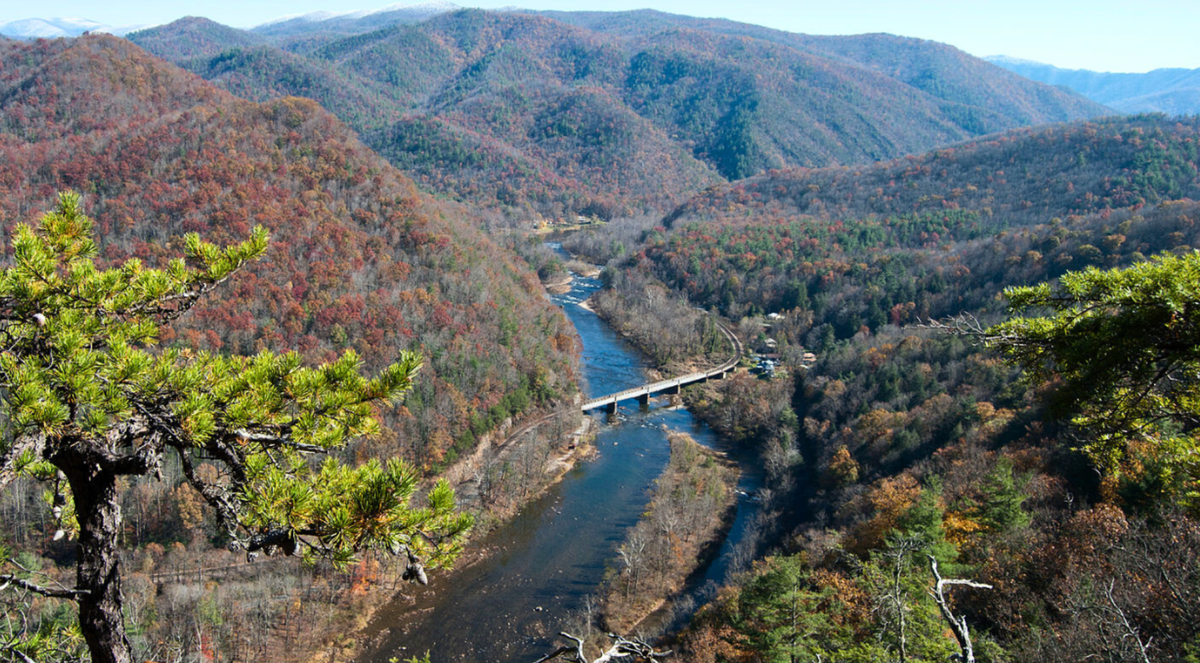Federal Agency Halts Destruction of Beloved Appalachian River
A rail company mining the Nolichucky River Gorge must stop unnecessary damage, says U.S. Army Corps.

A rail company mining the Nolichucky River Gorge must stop unnecessary damage, says U.S. Army Corps.
a huge win for the Nolichucky River, downstream communities vulnerable to flooding, and local communities that depend on tourism connected to this renowned paddling destination.

Since October, a major railroad company has been using incredibly harmful practices of mining river rock in the gorge in East Tennessee and western North Carolina as it repairs a rail line damaged by Hurricane Helene.
A lawsuit from SELC, on behalf of American Rivers and American Whitewater, prompted the U.S. Army Corps of Engineers to tell CSX Transportation to stop tearing up the treasured Nolichucky River in the process, especially when less harmful methods are standard practice.
A place of pristine beauty, the Nolichucky River Gorge is widely known as one of the premier whitewater rafting and kayaking locations on the East Coast. It runs through the heart of Tennessee’s Unicoi County, where tourism generates millions of dollars in visitor spending each year.
“From the beginning, we’ve said that CSX should be able to rebuild its rail line in the Nolichucky River Gorge,” says Patrick Hunter, managing attorney of SELC’s Asheville office. “It just needs to do so in a way that follows the law and doesn’t put the river and the people that depend on it at risk.”
There’s a better way to do this
“It’s encouraging news for a special place that means so much to so many people,” says Kevin Colburn, a SELC partner and the national stewardship director for American Whitewater.
The Army Corps is now prohibiting CSX from performing any type of excavation or dredging out of the Nolichucky riverbed or its intrastate tributaries until new approvals are in place. It does not prevent CSX from rebuilding its rail line in a responsible and less destructive way.
Now we have hope that the remaining five miles of the Gorge will be spared from cobble mining and other unnecessary impacts.KEVIN COLBURN, AMERICAN WHITEWATER
The rugged nature of the waterway led to it being designated as a wild and scenic “study” river by Congress in the 1970s. This move was supported by the Forest Service, which has described it as, “one of the deepest, most spectacular gorges in the eastern United States.”
Mining the river for rock and fill is much more destructive than the standard practice of trucking materials in from upland quarries. In this instance, the unnecessary digging and churning was inflicting irreparable damage to the river, threatening local businesses, and impacting flooding risks for communities downstream.
“After losing so much in recent months, it’s been really hard to watch the damage being done to the Nolichucky,” Colburn adds. “Now we have hope that the remaining five miles of the Gorge will be spared from cobble mining and other unnecessary impacts.”

In the weeks since discovering CSX’s mining practices, community members, state and local officials, and nearby businesses expressed significant concerns about the impact it could have on the river and our nearby plus downstream communities.
The Tennessee Department of Environment and Conservation also sent a notice of violation to CSX this week and ordered the company to stop excavation of the river.
“CSX crossed a line that would have jeopardized the health and integrity of the Nolichucky River,” says Erin McCombs, Southeast conservation director for American Rivers. “Our nation’s rivers deserve utmost care as a vital resource that we all share.”

